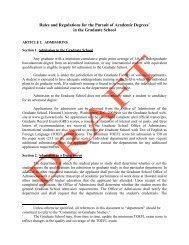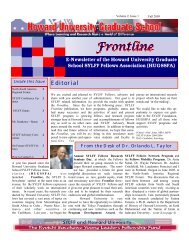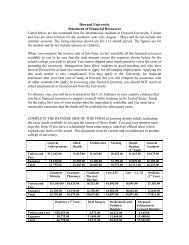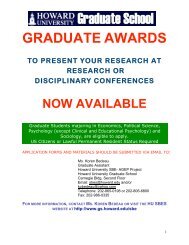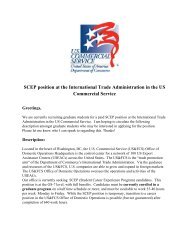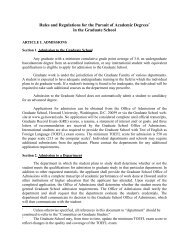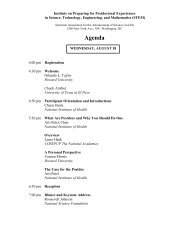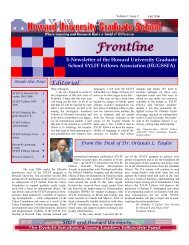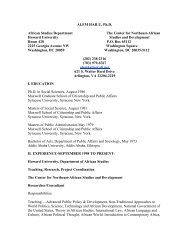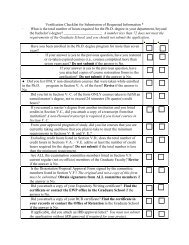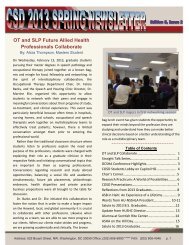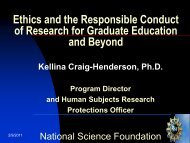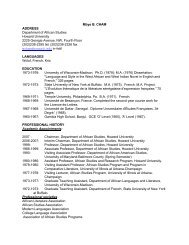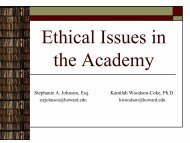Self-Study Design - Howard University, Graduate School
Self-Study Design - Howard University, Graduate School
Self-Study Design - Howard University, Graduate School
You also want an ePaper? Increase the reach of your titles
YUMPU automatically turns print PDFs into web optimized ePapers that Google loves.
Scope of Work and Objectives.<br />
This scope of work covers the gathering of data to assess whether <strong>Howard</strong> <strong>University</strong>’s system<br />
of governance clearly defines the roles of institutional constituencies in policy development and<br />
decision-making. The work group will also assess the governing body’s degree of autonomy to<br />
ensure its institutional integrity and its responsibility toward policy and resource development,<br />
consistent with <strong>Howard</strong>’s mission. To work efficiently and to assure corroboration of both<br />
quantitative and non-quantitative data, the work group will work collaboratively with other work<br />
groups. It has been determined that at a minimum there are three other work groups with whom<br />
this work group will be involved:<br />
• Standard 2 Work Group to assess how the governance structure is involved in the<br />
<strong>University</strong>’s planning process<br />
• Standard 5 Work Group to examine how administrative structures interact with<br />
governance structures to support the institutional mission<br />
• Standard 7 Work Group to examine how assessment is used to guide the leadership and<br />
governance structures<br />
Major Research Questions.<br />
1. Does <strong>Howard</strong> <strong>University</strong> have a well-defined system of collegial governance including<br />
written policies outlining governance responsibilities of administration and faculty and<br />
readily available to the campus community?<br />
2. How well does the governing body function in practice?<br />
3. Does <strong>Howard</strong> <strong>University</strong> possess written governing documents, such as a constitution,<br />
by-laws, enabling legislation, charter, or other similar documents that delineate the<br />
governance structure, provide for collegial governance, and assign authority and<br />
accountability for policy development and decision-making?<br />
4. Does <strong>Howard</strong> <strong>University</strong> provide appropriate opportunity for student input regarding<br />
decisions that affect them?<br />
5. Does the <strong>University</strong>’s governing body fulfill its fiduciary responsibilities to a level that<br />
will ensure the <strong>University</strong>’s continued compliance with the accreditation standards of the<br />
Middle States Commission?<br />
6. Does the <strong>University</strong>’s governing body reflect constituent and public interest and is it of<br />
an appropriate size to fulfill all of its responsibilities?<br />
7. How does the governing body certify to the Commission that the <strong>University</strong> complies<br />
with eligibility requirements, accreditation standards, and policies of the Commission?<br />
8. Does the <strong>Howard</strong> <strong>University</strong> governing body assist in generating resources needed to<br />
sustain and improve the <strong>University</strong>?<br />
9. What manner of conflict of interest policies are in place for the governing body to<br />
address matters such as remuneration, contractual relationships, employment, family, or<br />
financial interests that could interfere with the duties of the governing body?<br />
10. What is the nature and extent of faculty input into policy decisions that may affect them?<br />
These key questions contain within them numerous sub-levels of inquiry. Throughout the<br />
inquiry, the work group will focus on both policy and practice to determine whether practice is<br />
always aligned with stated policy.<br />
18



